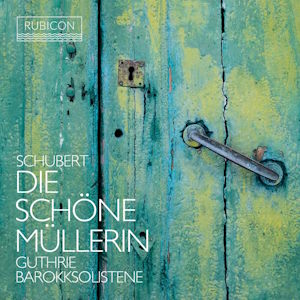
Franz Schubert (1797-1828)
Die schöne Müllerin D795 (1823)
Thomas Guthrie (baritone)
Barokksolistene/Bjarte Eike
rec. 2022/23, Studio Epidemin, Gothenburg, Sweden; Gighouse Recording Studio, Leamington Spa, UK
Sung texts with English translations enclosed
Reviewed as download from press preview
Rubicon RCD1086 [60]
The proverbial London buses arriving in clusters have sometimes been likened to the issuing of recordings: for a long time there hasn’t been a new recording of a specific work, and suddenly two or more arrive almost simultaneously. This doesn’t apply to Die schöne Müllerin. They arrive with some regularity all the time, even though the present one came hard on the heels of Samuel Hasselhorn’s. But this latest addition to the discography is a somewhat redressed miller maid. Her traditional piano costume has been disposed of and replaced by a string quintet (including double bass) and amended with two 19th century guitars. A gimmick, some readers may think, but Thomas Guthrie who, besides being responsible for the English translation and singing the solo part, has also made the arrangements of the accompaniments, and he has indulged in some really creative thinking. The outcome of this is a truly fascinating refurbishment of the today 200-year-old score. Purists may think that this is a violation of Schubert’s music and intentions, but Guthrie maintains the opposite in his liner notes:
“… performing Schubert songs in white tie and tails, standing in the crook of a large grand piano in a refined, often large-capacity cultural venue, as has become a tradition, began to seem to me to be inauthentic, and even contrary to the spirit in which Schubert had composed them. To do so is certainly to offer something quite different from what he would have expected. His songs were written for intimate social occasions, celebrating friendship and storytelling in the most relaxed, offhand and (often) alcohol-fuelled way, with participants bringing instruments and even dressing up in characterful costumes. In other words, they are not so different to many other examples of music, theatre and storytelling intended to bring people together in real-life situations to feel connected, imbued with a sense of belonging and shared moments, and embraced by love, humour and human warmth.”
The ‘high culture’ as we know it today – the opposite is, I suppose, ‘mass culture’ – was something that developed towards the end of the 19th century and was an unknown phenomenon for Schubert. Another aspect that Guthrie also mentions in his notes, is that Schubert “expected his singers to ornament and adapt his music.” Even though he isn’t the first to put this into practice – as long ago as 2005 I commented on this in Jan Kobow’s recording of Die schöne Müllerin (review), and Guthrie is just as discriminating in his use of decorative elements as Kobow. It should sound like an improvisation – and it does. No one is expected today to be upset. The string arrangements on the other hand may raise an eyebrow or two, since they change the character of the music. In Das Wandern this is very distinct. The presence of a double bass playing pizzicato and the robust playing of the baroque-trained strings give an impression of folk music fiddlers, and the music swings. Thomas Guthrie himself sings with light lyrical tone and an enticing freedom, in a way artless, like a popular contemporary troubadour. This, undoubtedly, in combination with the down-to-earth playing, brings us further from the sometimes stilted highbrow atmosphere of the gilded marble halls and closer to, say, a jam session – but hardly as far as the alcohol-fuelled nightclub milieu hinted at in the quotation above – and I must immediately clear away every suspicion that ‘down-to-earth’ implies crudeness. The arrangements are sensitive and sophisticated; some of the songs – Der Neugierige (track 6) the earliest example – are accompanied by guitar only, in Tränenregen (track 10) the pizzicato strings imitate the tears, in the heart-rending Trockne Blumen (track 18) I hear heart beats. The accompaniments are very varied and adjusted to the texts – towards the end very sparse – and likewise the singing catches the varying moods without breast-beating histrionics, just nuances and superb articulation. Just listen to the expressive staccato singing in the crucial Der Jäger (track 14) – the peripeteia of the whole cycle. The accompaniment is just as disturbed as the singer.
For me, personally, this interpretation of one of the greatest masterworks in the field of art song, is a revelation. I can believe that people with an inbuilt negative attitude towards a genre that breathes haughtiness and artificiality can find this a tempting gateway to a new world, populated with ordinary human beings, having ordinary human feelings like happiness and sorrow, love and hate, reacting like the characters in the songs. The sharp dividing line between the cultures needs to be broken, to the benefit of everybody, and hopefully Thomas Guthrie can be the spearhead in this campaign to even out the way. I don’t intend to suggest that this way of performing Schubert will make the original, established version obsolete, but it is a fresh and stimulating alternative that I urge readers to give a try.
Göran Forsling
Help us financially by purchasing from



















